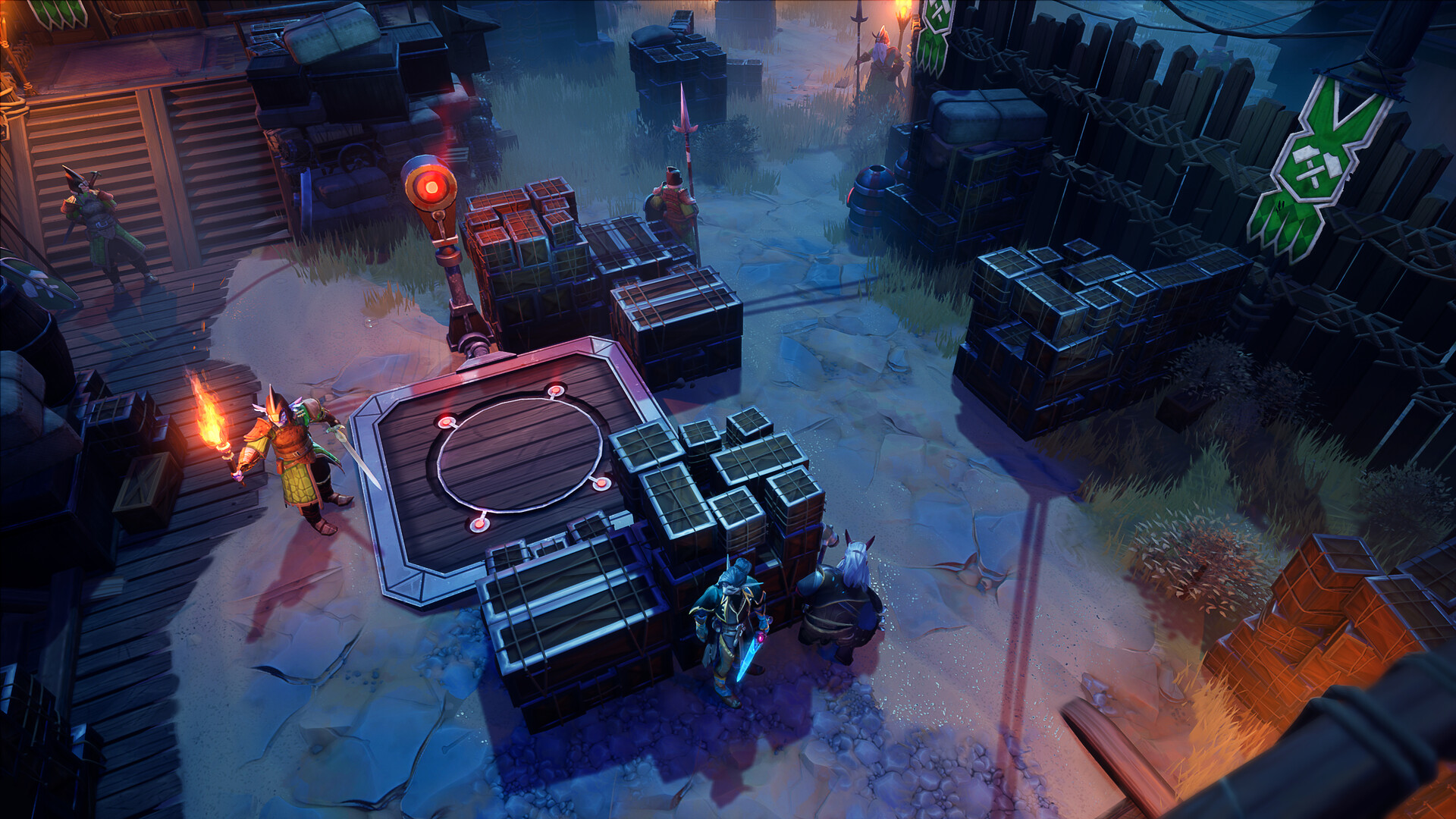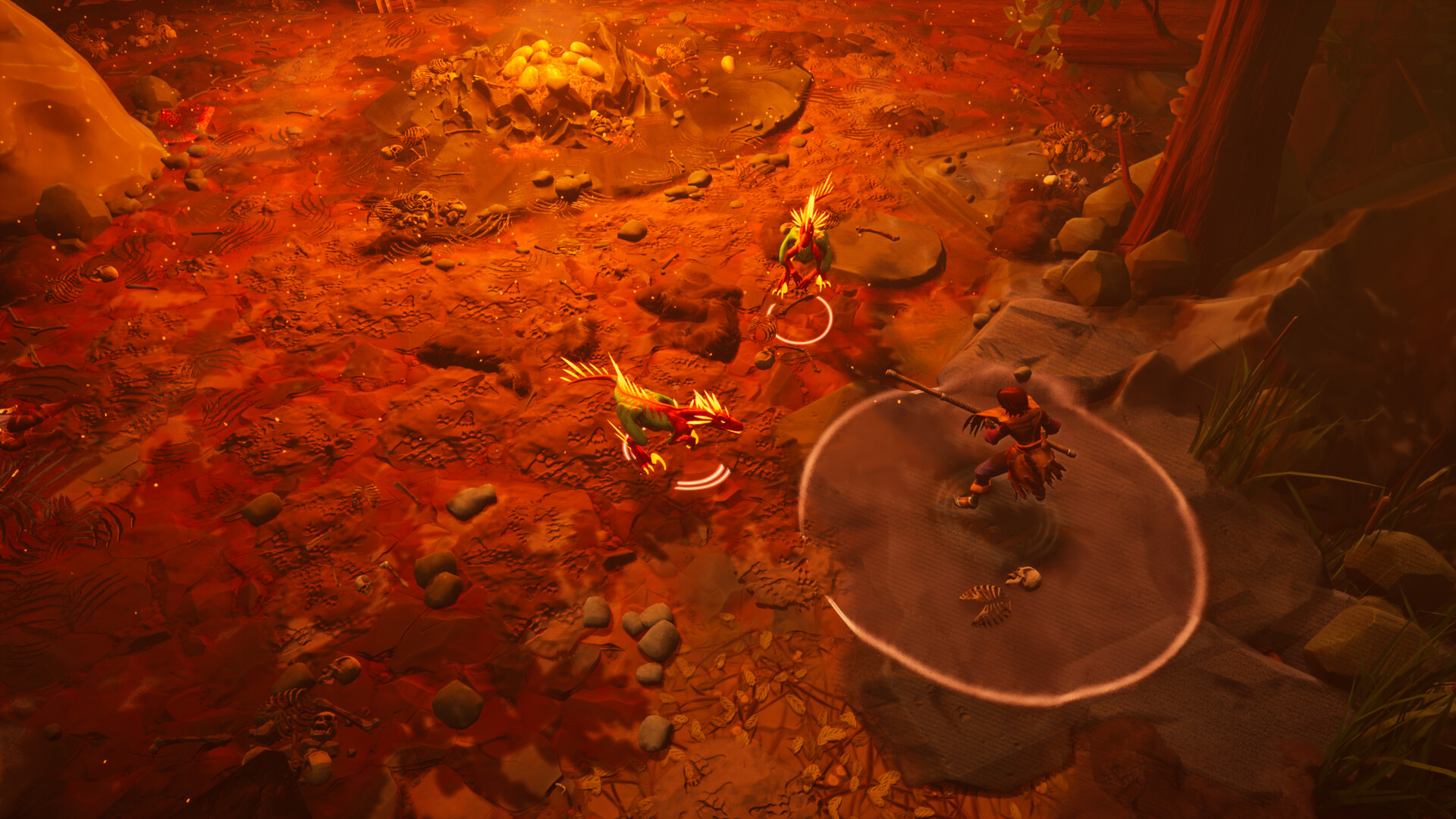Unforetold: Witchstone is a CRPG that captures the wild flexibility of D&D and other tabletop roleplaying games
How to make friends and influence people.
After making my adventurer in Unforetold: Witchstone (a roguish elf with a penchant for magic) and finishing up a tutorial fight at sea, the first thing that I did—standing on the docks, probably looking a bit damp—was intimidate the first random NPC I encountered, forcing them to join my party. I then proceeded to do the same thing to every other nearby NPC until my roster was full. Who needs charm when you can just be an arsehole?
These NPCs were not among the fleshed out characters that Spearhead Games has designed to be your allies in this sandbox RPG, but you can recruit them all the same. Everyone in the game can be influenced in myriad ways, as long as the dice rolls your way and your stats are up to the task. Thus, I began my adventure accompanied by a raggedy band of rightly miserable refugees who absolutely did not want to be traipsing after some random dude they just met.
Making NPCs my minions is only the tip of the iceberg when it comes to the Influence system, as Spearhead's co-founder and creative director Malik Boukhira explains. "So you start by determining something you want from that character, whether it's just following you around, meet you somewhere, attack someone, give you something they have in their inventory or joining you as a companion even if you want—and then you pick an approach. How do you go about that? You can go sweet talk them, be charming about it, you can threaten them, you can blackmail them, you can argue with them logically, if you're a smart character. If you're a cleric, maybe you can convince them it's the right religious thing to do.
"Depending on that character and that order, that approach might be more or less difficult. For example, a brave and courageous warrior might not respond very well to physical threats. But maybe they're gullible a bit and maybe you can sweet talk them into doing certain things. Ordering a faction guard to attack their colleague maybe won't go so well, but if you find someone they dislike, it might be easier."
In most RPGs, the majority of NPCs are set dressing, existing to give locations the illusion of life. Trying to talk to them might only elicit a quick canned response rather than kicking off a conversation. But in Witchstone there are no truly incidental NPCs—all of them have relationships, points of view and the potential to become a problem-solving tool. And by learning more about them and using your skills to gain insights into their personalities and desires, you can exert more influence over them.
Friends with benefits
A very early quest saw me trying to find a way inside a city's walls, and my silver tongue failed me during a conversation with a pair of guards at the gate. I heard about a secret way inside, through some catacombs, but that entrance was also guarded. Luckily, this particular guard was a shifty bloke, and told me he was willing to let me in if I could find some items for him. As a busy elf on an important mission, however, I didn't feel like wasting my time on a treasure hunt for a crooked cop, so I took another route: learning more about this guard, and using that information to make him trust me, after which I talked him into leaving his post. All I had to do was tell him that someone wanted to speak with him, which he believed, leaving the entrance unguarded.

I confess I absolutely felt like a master manipulator after simply getting a guard to leave his post, but obviously there are much more dramatic ways to change the world. "So let's say you're in a town, and you want to get rid of a faction that's controlling the town," says Boukhira. "You might just charge in and try to attack them. You could maybe find allies, convincing a couple of people to join you in that fight—if you want to fight but not be alone. You could be much more mischievous: we have a quite deep Frame system, and you could frame one of the leaders of that faction for crime, for a murder of one of his own faction officers to create internal strife, have them arrest their own leader, things like that, to gradually get rid of them. You could be diplomatic, maybe try to use the really cool Influence system to negotiate something with them, or be evil about it and find some dirt about the leader and blackmail them into leaving town."
Keep up to date with the most important stories and the best deals, as picked by the PC Gamer team.
The mark you leave on the world can be gargantuan. You can wipe out whole towns, with every single person in it being killed off. Unforetold: Witchstone has a turn-based combat system where you can use a mix of magic and technology to take out your foes, but as you're likely starting to realise, you can also annihilate the whole town without getting your hands dirty, instead pitting its citizens and factions against each other and just watching the carnage unfold.
This flexibility naturally has an impact on quest design. Instead of being given a journal bursting with side quests and main quests with prescribed objectives and paths, Unforetold: Witchstone gives you broad goals and lets you achieve them however you want. While there are quests, which the game refers to as opportunities, none of them are mandatory.
"We're moving away from the old model of players having to go through a series of quests," says lead game designer Philip Tam. "What we do instead is that players have goals, and you take on people's opportunities, AKA quests, to help you achieve the goal that you want to achieve. So if, let's say, you want to get in the good graces of a faction, because you want to join them, then you will go and do the opportunities that they provide, and get more appreciation from them. But it is totally optional. You can bypass that by knowing people's wants, and manipulating them that way to achieve your goal."

Tabletop roleplaying has always influenced RPGs, but over the last few years that influence has grown dramatically. Baldur's Gate 3 is probably the strongest example of this, at least when it comes to the RPGs of 2023, where its sandboxy, experimental vibe really captures the spirit of tabletop antics. Unforetold: Witchstone, however, feels even closer to that tabletop philosophy of just picking a route to achieve your objective and being able to do it.
Do your thing
"The aspects of tabletop that we want to bring to Witchstone is that freedom and player agency," says Tam. "In a tabletop RPG, players are more free to do stuff that they want to do. We want to give them more options that way, and the whole back and forth between a player and the DM, where players do certain things, and the DM responds a certain way. And our game tracks all these player choices and feeds them the best scenario for them to express themselves … the whole point is that there is a dialogue, always a constant dialogue, between the player and the game."
Often, when I'm in RPG towns running around chatting to NPCs, I'm eager to get out and go on an adventure, leaving the town's denizens behind, but in Unforetold: Witchstone, even brief chats feel meaningful as NPCs feed me information that, bit by bit, allows me to construct a solution to my schemes. Big plans can be born from seemingly incidental conversations. It's the same reason I can go through a whole TTRPG session just shooting the breeze with some NPCs and still feel like I've made some progress and experienced something anecdote-worthy. And just like a TTRPG, gathering information and influencing NPCs is just one solution: breaking into buildings and looting everything, fighting your way through dungeons and working for factions will all advance your goals.
If any of this tickles your fancy, you won't have to wait long before you can take the game for a spin. As we revealed in the PC Gaming Show: Most Wanted, Unforetold: Witchstone is launching in early access on January 25, 2024.

Fraser is the UK online editor and has actually met The Internet in person. With over a decade of experience, he's been around the block a few times, serving as a freelancer, news editor and prolific reviewer. Strategy games have been a 30-year-long obsession, from tiny RTSs to sprawling political sims, and he never turns down the chance to rave about Total War or Crusader Kings. He's also been known to set up shop in the latest MMO and likes to wind down with an endlessly deep, systemic RPG. These days, when he's not editing, he can usually be found writing features that are 1,000 words too long or talking about his dog.

